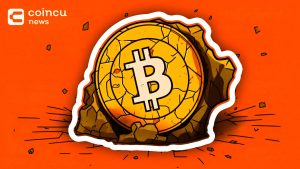
Is Bitcoin a pyramid scheme?
The Bitcoin ETF significantly overestimates the amount of money BTC can attract, as well as the financial risks that surround this market. Therefore, the introduction of national digital currencies is necessary.
Many people think that Bitcoin (BTC) looks like a pyramid every day, since the recent launch of the US Bitcoin Exchange Traded Fund (Bitcoin ETF).
This opens up the potential for customer acquisition Billion USD in Bitcoin, which gives investors and speculators who were already at the bottom of the market a chance to get off the top before the pyramid collapses.

Many people believe that Bitcoin (BTC) looks like a pyramid every day since the recent launch of the US Bitcoin Exchange Traded Fund (Bitcoin ETF) |
This also makes the official regulation of BTC and other cryptocurrencies and the introduction of Central Bank Digital Currencies (CBDCs) more urgent and attractive, before too many people become overwhelmed and suffer “injuries” from a future market crash. That seems to have come up when Bitcoin recently saw a vertical drop to $ 42,000 / BTC and the entire market was red.
It can be seen that Bitcoin, be it the true origin of this obscure cryptocurrency, the idea of Satoshi Nakamoto or others, is undeniable that Bitcoin is an ingenious tool for making money. The market value of all bitcoins mined to date, whether digital or physical, is estimated at around $ 1 trillion. But the amount a Bitcoin ETF is likely to attract could double that amount if the cryptocurrency persists.
And since the total number of bitcoins produced is to be limited to 21 million and only just over 2 million have to be mined, the demand for an ETF for the cryptocurrency could soon exceed the supply.
There are big delusions not only with BTC . Before that, there was the frenzy of the 17th century tulip event, which drove the price of this flower to absurd heights, or the dot-com bubble burst in 2000. Do we have a BTC bubble now? Some have even argued that Bitcoin could become a store of value or an inflation hedge on par with gold. Yes, these can be dampened by emerging cash flows, but the comparison to gold is lame.
Gold has held its value for centuries and is a practically indestructible commodity. Smash, melt, or reshape into shape, and gold will remain as valuable as a semi-monetary asset or as precious as no digital blockchain token can ever hope for.
Why have BTC and other digital assets gained such credibility that the world’s largest exchange launched a BTC ETF that allows investors to link Bitcoin to other assets? In fact, the US Securities and Exchange Commission approved the launch of the ProShares BTC Strategy ETF as it holds Bitcoin futures contracts that are traded on the Chicago Mercantile Exchange. However, the strong pull of cryptocurrencies suggests that other traded investment vehicles will follow suit.
The rise and rise of bitcoin and altcoins is another manifestation of the currency craze that began with quantitative easing following the 2008 global financial crisis and accelerated dramatically during the Covid-19 pandemic.
In an “accommodative” financial environment greatly improved by fiscal stimulus, liquidity has flowed into stocks, bonds, real estate and now crypto assets, driving valuations to extremes.

Currently, many countries in Southeast Asia or Asia have started accelerating the process of researching and testing CBDC. |
Is Bitcoin more than just a crypto asset, but was created as a peer-to-peer electronic cash system in 2009 when confidence in sovereign currencies was lost? At that point, it caught the attention of curious investors about cryptocurrencies as an asset. Bitcoin and other cryptocurrencies act as channels for money transfer outside of the banking system and as such promise to avoid the high fees banks have to pay.
However, according to some analysis, the high fees associated with the Bitcoin network make transfers impractical for most people. Hence, the only real value of cryptocurrencies comes from market transactions and not from savings on money transfers, although money regulators fear that money laundering could add illegal value to some cryptocurrency holders.
The best way to avoid this is to issue a central bank digital currency that is pegged unchanged to the value of the local currency. Let’s say the digital renminbi hits the market next year; Even if it doesn’t have the speculative appeal of Bitcoin, it will help the country strengthen its financial security much more.
Currently, many countries in Southeast Asia or Asia have started accelerating the process of researching and testing CBDC. In Vietnam, too, the Prime Minister issued Decision No. 942 on June 15, 2021, mandating the state bank to research, develop and pilot a virtual currency based on blockchain technology in the period 2021-2023. Understandably, this is a start for CBDC research in Vietnam, which has flourished in recent years with the same global trend as the strength of the fintech platform. At SBV in particular, the use of CBDC will eliminate cash-related issues such as money printing, distribution and counterfeiting …
Vietnam has seen relatively rapid and stable macroeconomic development in recent years. The achievements of economic development are undeniable, from these results Vietnam will catch up with other countries based on the approach to Industrial Revolution 4.0 and the digital economy.
.



















